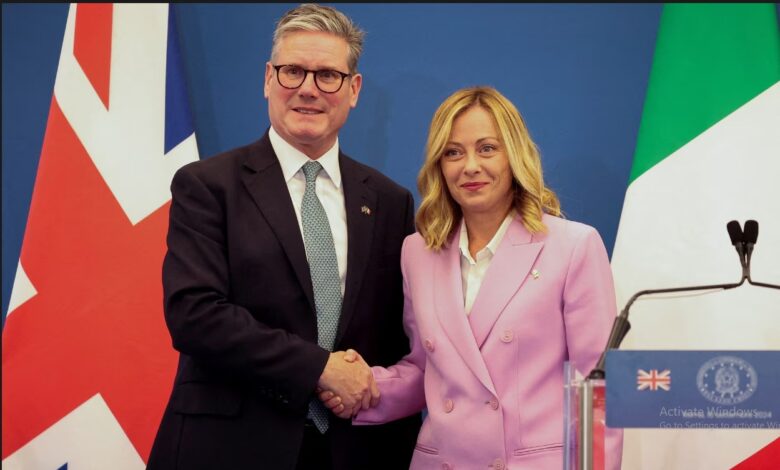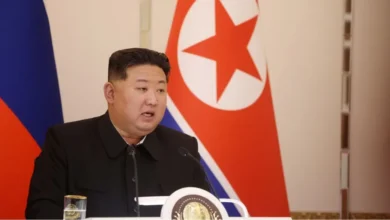Italy’s migrant pact with Albania makes no sense. So what’s the real reason Starmer is showing interest?

by Lea Ypi – The Guardian:
Britain’s prime minister knows such a plan won’t work. He’s cosying up with Giorgia Meloni for an entirely different reason
One cold, late evening in the winter of 1999, I was waiting for a train at Termini station in Rome when I noticed an old lady struggling with her suitcases and offered to help. “Signorina,” her voice trembled ever so slightly. “Fortunately there are still youngsters like you. I was very worried. This station is full of Albanian muggers. It’s an invasion.”
Back then I had no courage to tell her I was Albanian. One of the lucky ones – a student on a scholarship, unlike my fellow citizens who worked as cleaners, builders, carers and sex workers. We made headlines in Italy in those days. Sometimes as a nation of smugglers, pimps and burglars; sometimes as failed individuals, socialised under a different system, who struggled to integrate; and sometimes as corrupt, lazy people unable to implement in their own country the formula for success they had seen beamed over the Adriatic Sea on Silvio Berlusconi’s television channels
Invaders” was just one of the labels. Although, taken literally, the only invasion in the history of the two nations went the other way round. It happened on 7 April 1939, when Mussolini’s troops disembarked in my home city of Durrës and annexed the Albanian kingdom to the kingdom of Italy, deploying it as a military base for the subsequent invasion of Greece, exploiting its copper, chrome and other natural resources, and adorning the Albanian flag with fascist symbols.
Since the end of communist rule in the early 1990s, no Albanian politician has dared to challenge an Italian government on the legacy of its colonial relation to Albania. On the contrary, as with the recent agreement that enabled Giorgia Meloni’s government to process asylum seekers extraterritorially in Albania, the special historic friendship between the two nations is often celebrated. After all, unlike the Italian invasion of Ethiopia, we were spared chemical weapons. The incident in March 1997 in which dozens of women and children drowned after being hit by an Italian patrol boat is now classified as an accident.
Still, a government is never the same as its people. Many Albanians also remember with gratitude the hospitality they received from the 1990s onwards. During my years of study in Rome, I met dozens of Italians who assured me foreigners were welcome, and apologised for the insults I often heard in public. They explained that Italians too had once been migrants. They were not the ones who believed in the myth of Italiani brava gente (Italians, the good people), which served to normalise and excuse the legacy of Mussolini. They did not think the nation should trump everything. They did not vote for parties like Meloni’s.
British officials, reportedly
including Keir Starmer, have declared that the UK government is interested in a migration pact like the Albanian one. It won’t be with Albania. The Albanian government previously considered requests from British officials and turned them down, declaring that the country would never become a dumping ground for Europe.
Yet all that Britain needs for an equivalent deal is a former colony with a government whose memory is sharp enough to remember the roads and buildings its master constructed in the past century but not the human beings it exploited in the past few decades. A people sufficiently traumatised by its recent past to have removed from memory its distant one, and governed by a submissive political elite compliant with the liberal order, who will repeat the mantra that we must all share the consequences of migration without ever questioning its geopolitical causes.
Yet it would be naive to criticise Starmer’s efforts to tackle migration by moralising on these issues, as many people on the left are inclined to do. When the argument that we must “be pragmatic” is the first to be put on the table, principles – memory, responsibility, care for vulnerable people, you name it – have already been suspended.
How to oppose it, then? Perhaps by plain logic. Migration deals such as the one Labour is apparently studying are premised on various assumptions: that migration itself is a problem, that irregular migration is best fought with draconian border restrictions, that extraterritorial detention can act as a deterrent. There is ample research showing each premise to be dubious. But even assuming they are valid, there are three further issues any “pragmatic” politician ought to confront.
Politically, the Albania model is presented as a novelty in the management of migratory flows because it involves cooperation between an EU candidate and an EU member state. Inspired by the desire to find a “structural” solution to the issue of irregular immigration, in reality it does exactly the opposite: it leaves to bilateral negotiations what ought to come about as a result of an EU-wide process. More than that, and more relevant to the UK, which has no plan to rejoin the EU, it creates a dangerous precedent in which individual countries pursue their own deals to address their own migration “problem”, heading off chances of a truly coordinated process across Europe.
Second, the principle of non-refoulement, enshrined in the 1951 UN convention relating to the status of refugees, prohibits the expulsion or return of people to countries deemed unsafe. Meloni insists Albania is safe, citing its EU candidate status. But if that is the case, why are pregnant women, children and other vulnerable categories exempted from the deal?
Third, there is the economic question. To comply with international law, deported migrants must remain Italy’s responsibility. According to the agreement between Italy and Albania, Italy is responsible for all the costs of construction and management of the two centres, as well as police personnel, doctors, nurses and administrative officials, for a total expense that has been estimated to reach €670m (£562m). An irregular migrant in Albania costs Italy the same or more than they would if they were processed in their own territory. The only benefit is that migrants become invisible – lontano dagli occhi, lontano dal cuore, as the Italian saying goes
We are told that Starmer’s government is pragmatic and interested in what works. But how can a “solution” that makes no logical sense from a political, legal and economic point of view still be considered “pragmatic”?
Perhaps there is only one plausible answer: propaganda. Labour knows it sits on a precarious majority, threatened by far-right politicians who scream about the danger of migration. Labour clearly thinks it can send a message to the most right-leaning voters in its coalition that it too is tough on migrants. In doing this, it takes its liberal and leftwing supporters for granted. They may suspend their principles and forgive the rhetoric for a time. But the political, legal and economic contradictions will remain. And if the plans go forward, they’ll start to wonder what kind of pragmatism they are supporting.





